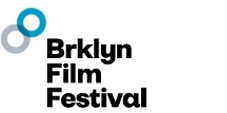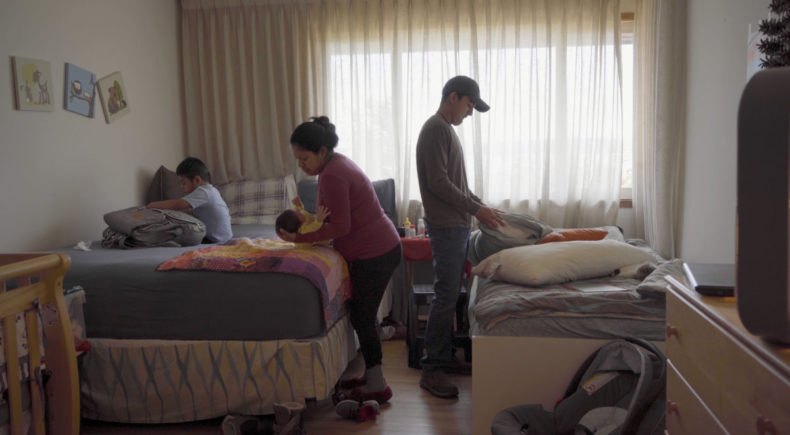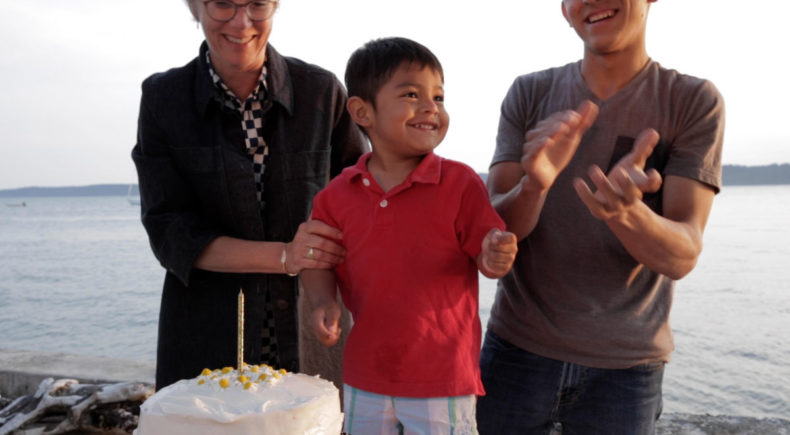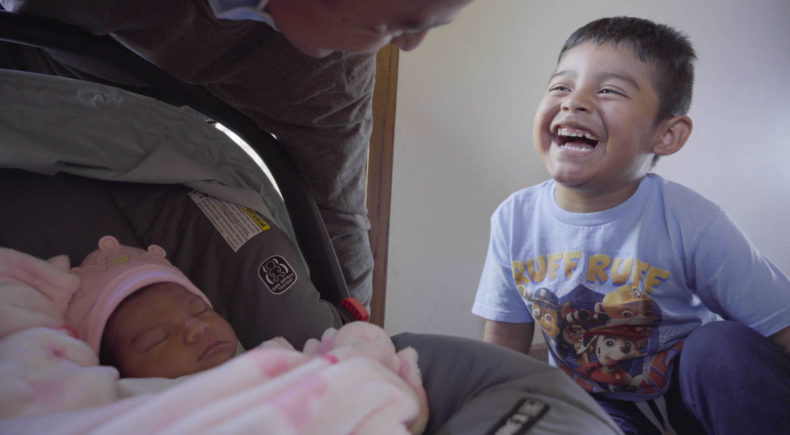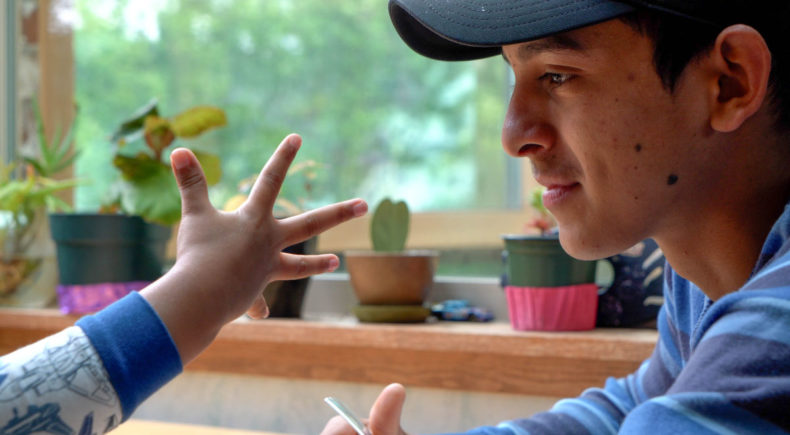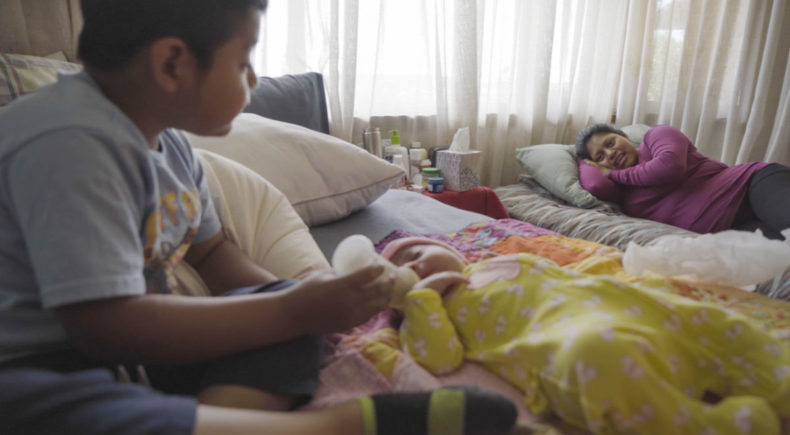All We Carry
Director: Cady Voge
United States, Mexico, 2023, 84 min
Shooting Format:Digital
Festival Year:2024
Category:Documentary Feature
WINNER: Spirit Award
Crew:Producers: Laura Pilloni, Laura Tatham, Cady Voge. Executive Producers: America Ferrera, Ryan Piers Williams, Michael Skolnik; Editor: Rachel Clara Reed; Consulting Producers: Rachel Lears, Dawn Valadez; Consulting Editor: Toby Shimin; Composers: Alejandro Starosielski, Ezequiel Tarica
Email:allwecarrydoc@gmail.com
Synopsis
Mirna and Magdiel are an ordinary family living under extraordinary circumstances. After fleeing violence in Honduras, joining the infamous migrant caravan, and enduring months in a US detention center, they are sponsored by a synagogue in Seattle, who lend them an empty beachfront mansion while they wait for their asylum verdict. Over three years, this young family navigates countless moments–both life-altering and mundane–where grief, memory, and joy collide
About the director
Cady Voge is a filmmaker and journalist specializing in character-driven, longform, and vérité storytelling. All We Carry is Cady's feature directorial debut. Her other directorial credits include two short films, El Cristo Negro (2019) and Ballet In El Salvador is Alcira Alonso is Alcira Alonso (2019). As a filmmaker, she has shot, produced, and directed short films for NBC, The New Humanitarian, and other media outlets across the Americas. She is currently in pre-production on her next feature documentary, which examines OB/GYN Meg Autry's quest to launch a reproductive health clinic in federal waters in the Gulf of Mexico serving patients in abortion restricted states from Texas to Florida. In 2022, Cady was selected as a WIF/Sundance Financing Intensive fellow as well as a Film Independent Fast Track fellow.
As a journalist, Cady contributes to outlets including the BBC, The Guardian, Al Jazeera, and Wired, among others. Based in Colombia from 2015–2020, she has covered topics as diverse as cryptocurrency in Venezuela, the aftermath of Colombia's historic peace deal, reproductive health in Utah, and a Syrian restaurateur in the heart of Bogotá, but most of her reporting falls under the larger topic of migration. Cady met the participants of her debut feature documentary, All We Carry, while covering the migrant caravan in Mexico in 2018, for which her reporting was nominated for an Eppy. She has been an International Women's Media Foundation fellow and grantee, she is an alum of the Dart Center's Reporting Safely in Crisis Zones course, and she was selected for UNHCR's master class on forced displacement in Central America.
Before becoming a full-time storyteller, Cady directed an international peace education nonprofit organization for five years, which brought her all over the world while conducting facilitator trainings for college students.
Filmmaker's note
In 2018 I was working as a freelance immigration reporter in Colombia when I decided to fly to Mexico to cover the migrant caravan. There, I met Magdiel, Mirna, and baby Joshua, and followed their story all the way to the border. After spending three weeks together, I walked with them to the US port of entry, said goodbye, and walked away thinking “I hope that I still know them when they finally finish this process.” Back then, I didn’t know that that first piece I published about them would be the beginning of a five-year journey following a single family’s story.
A few months later, I did a second short piece about them, for which I was able to visit and film an interview with Magdiel while he was in a detention center in California, and visit Mirna while she was living with extended family in Washington State. Months later, when I visited them in Seattle after they had settled in the beachfront home given to them by members of a synagogue there, I thought our professional relationship was over; I stayed in their home, I filmed their 4th of July party for fun, and when they asked if I would be a bridesmaid in the wedding that the synagogue community was throwing them, I said “yes!”
When I began meeting the community members from the synagogue, it struck me that I felt like I’d known this congregation my whole life. They reminded me of all of the parents in my own community growing up. I realized that I was in a unique position—I had lived in Latin America and covered immigration years, I had bonded with Magdiel and Mirna while accompanying them on the intense experience of the caravan, and they had landed in a group of people who couldn’t have felt more familiar to me.
And, I had lived in border regions and covered immigration long enough to know that their story of being embraced and given the keys to an empty home by perfect strangers was a one-in-a-million experience for new arrivals to the US. All We Carry pushes the viewer to consider: What would it take for you to flee from your country, your home, and your family? If it were you, would you choose to participate in supporting this family if it might put you and your community at risk? Our story also begs the question: If this process is so difficult for a family with a whole community behind them, what must it be like for an asylum-seeker who does not receive support or institutional aid while their case is in process?
After covering this topic as a reporter, my motivation for making this film came from my desire to show the human moments that unfold after the news cameras are turned off. The spotlight is so often on the border, but what happens in these quieter moments of joy and grief that come in the long limbo periods while waiting for the answer to asylum cases that will determine people's fates. Our film gives viewers a chance to watch a story of a young family that is healing and growing, and who also happen to be immigrants in a country where immigration is one of the most polarizing issues of our time.
In March of 2020, as airports across the region began shutting, I left my home base in Colombia and relocated to Seattle to finish production and post-production on the film. Mirna and Magdiel have turned me into a filmmaker, and they have turned our film into so much more than an immigration story—it is a love story about healing, community, and partnership. And it’s the story of a family coming together to overcome seemingly insurmountable odds in their attempt to find their way home.

